Learning Experience Plans: Development and Implementation
VerifiedAdded on 2020/05/04
|12
|2771
|235
Homework Assignment
AI Summary
This assignment provides a detailed overview of learning experience plans for early childhood education, specifically targeting infants, toddlers, and children aged 3-5 years. It explores conceptual knowledge, sustained shared thinking, and dispositional learning as key pedagogical approaches. The document includes practical experience plans with titles like 'Balling play,' 'Picture books,' and 'Painting,' outlining materials, justifications, EYLF (Early Years Learning Framework) principles, learning outcomes, teaching strategies, and evaluation methods for each age group. The plans emphasize the importance of play-based learning, cultural integration, and fostering children's curiosity, confidence, and creativity. The assignment also highlights the role of educators in promoting learning, assessing children's progress, and creating supportive environments. Finally, the document underscores the connection between these learning experiences and the development of essential skills such as motor skills, literacy, communication, and problem-solving, aligning with the EYLF framework.
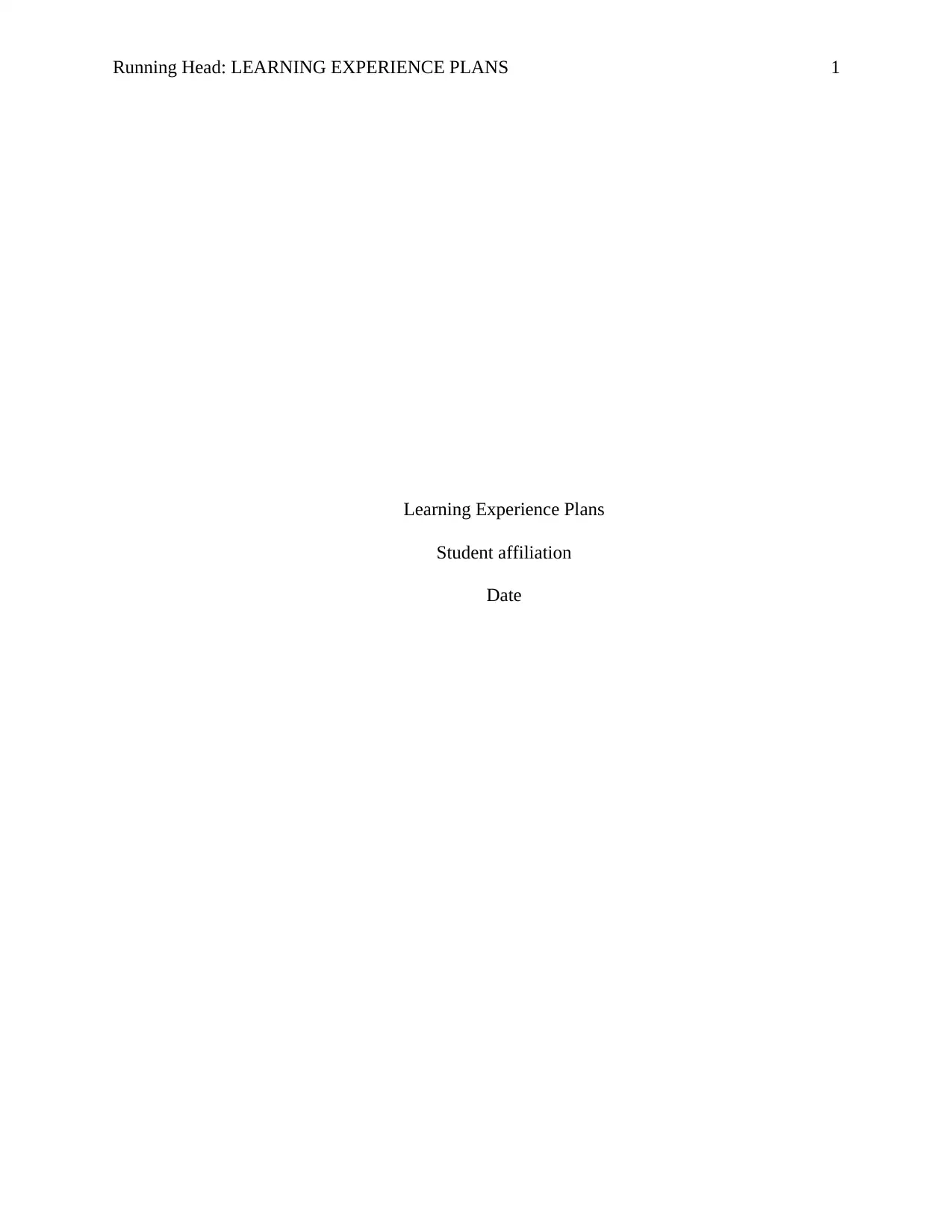
Running Head: LEARNING EXPERIENCE PLANS 1
Learning Experience Plans
Student affiliation
Date
Learning Experience Plans
Student affiliation
Date
Paraphrase This Document
Need a fresh take? Get an instant paraphrase of this document with our AI Paraphraser
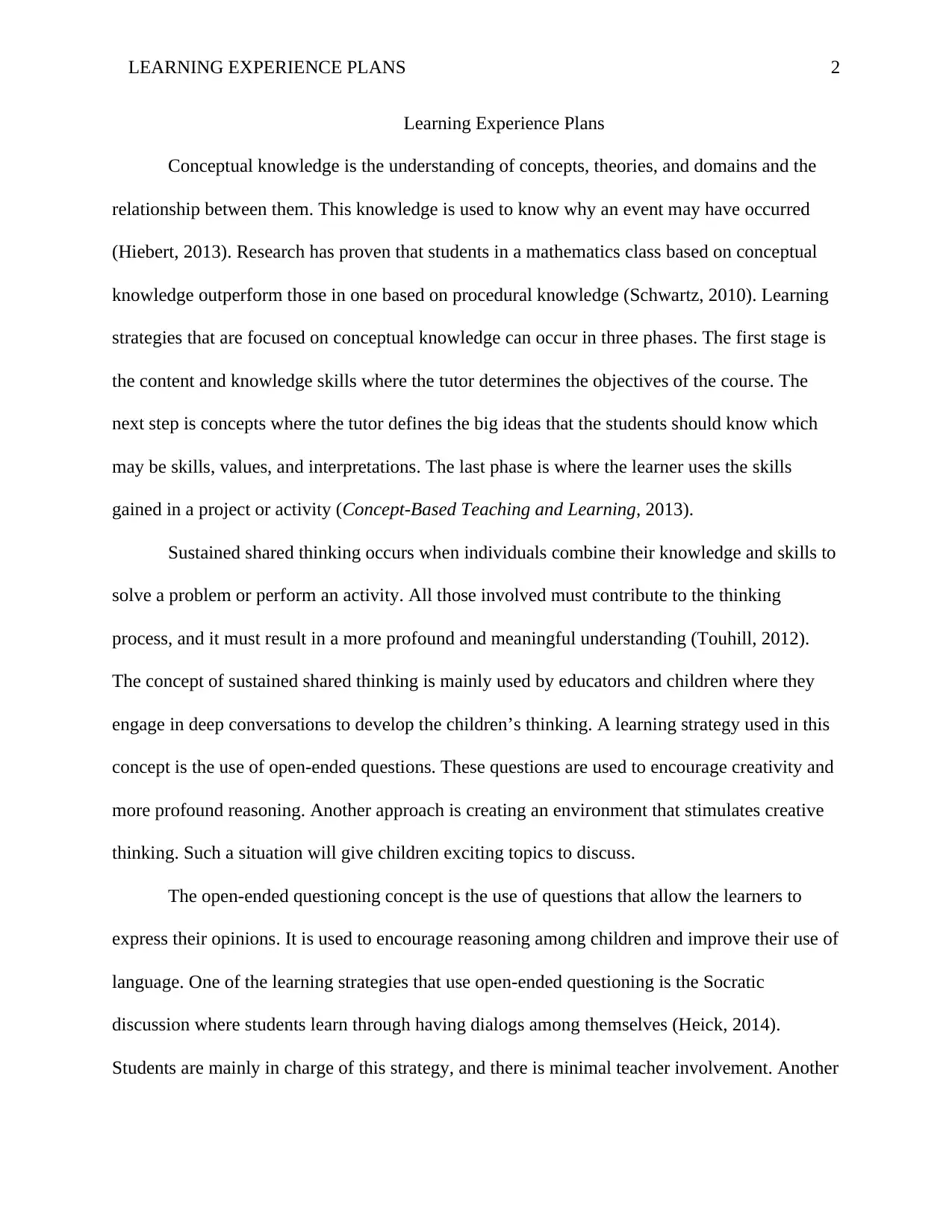
LEARNING EXPERIENCE PLANS 2
Learning Experience Plans
Conceptual knowledge is the understanding of concepts, theories, and domains and the
relationship between them. This knowledge is used to know why an event may have occurred
(Hiebert, 2013). Research has proven that students in a mathematics class based on conceptual
knowledge outperform those in one based on procedural knowledge (Schwartz, 2010). Learning
strategies that are focused on conceptual knowledge can occur in three phases. The first stage is
the content and knowledge skills where the tutor determines the objectives of the course. The
next step is concepts where the tutor defines the big ideas that the students should know which
may be skills, values, and interpretations. The last phase is where the learner uses the skills
gained in a project or activity (Concept-Based Teaching and Learning, 2013).
Sustained shared thinking occurs when individuals combine their knowledge and skills to
solve a problem or perform an activity. All those involved must contribute to the thinking
process, and it must result in a more profound and meaningful understanding (Touhill, 2012).
The concept of sustained shared thinking is mainly used by educators and children where they
engage in deep conversations to develop the children’s thinking. A learning strategy used in this
concept is the use of open-ended questions. These questions are used to encourage creativity and
more profound reasoning. Another approach is creating an environment that stimulates creative
thinking. Such a situation will give children exciting topics to discuss.
The open-ended questioning concept is the use of questions that allow the learners to
express their opinions. It is used to encourage reasoning among children and improve their use of
language. One of the learning strategies that use open-ended questioning is the Socratic
discussion where students learn through having dialogs among themselves (Heick, 2014).
Students are mainly in charge of this strategy, and there is minimal teacher involvement. Another
Learning Experience Plans
Conceptual knowledge is the understanding of concepts, theories, and domains and the
relationship between them. This knowledge is used to know why an event may have occurred
(Hiebert, 2013). Research has proven that students in a mathematics class based on conceptual
knowledge outperform those in one based on procedural knowledge (Schwartz, 2010). Learning
strategies that are focused on conceptual knowledge can occur in three phases. The first stage is
the content and knowledge skills where the tutor determines the objectives of the course. The
next step is concepts where the tutor defines the big ideas that the students should know which
may be skills, values, and interpretations. The last phase is where the learner uses the skills
gained in a project or activity (Concept-Based Teaching and Learning, 2013).
Sustained shared thinking occurs when individuals combine their knowledge and skills to
solve a problem or perform an activity. All those involved must contribute to the thinking
process, and it must result in a more profound and meaningful understanding (Touhill, 2012).
The concept of sustained shared thinking is mainly used by educators and children where they
engage in deep conversations to develop the children’s thinking. A learning strategy used in this
concept is the use of open-ended questions. These questions are used to encourage creativity and
more profound reasoning. Another approach is creating an environment that stimulates creative
thinking. Such a situation will give children exciting topics to discuss.
The open-ended questioning concept is the use of questions that allow the learners to
express their opinions. It is used to encourage reasoning among children and improve their use of
language. One of the learning strategies that use open-ended questioning is the Socratic
discussion where students learn through having dialogs among themselves (Heick, 2014).
Students are mainly in charge of this strategy, and there is minimal teacher involvement. Another
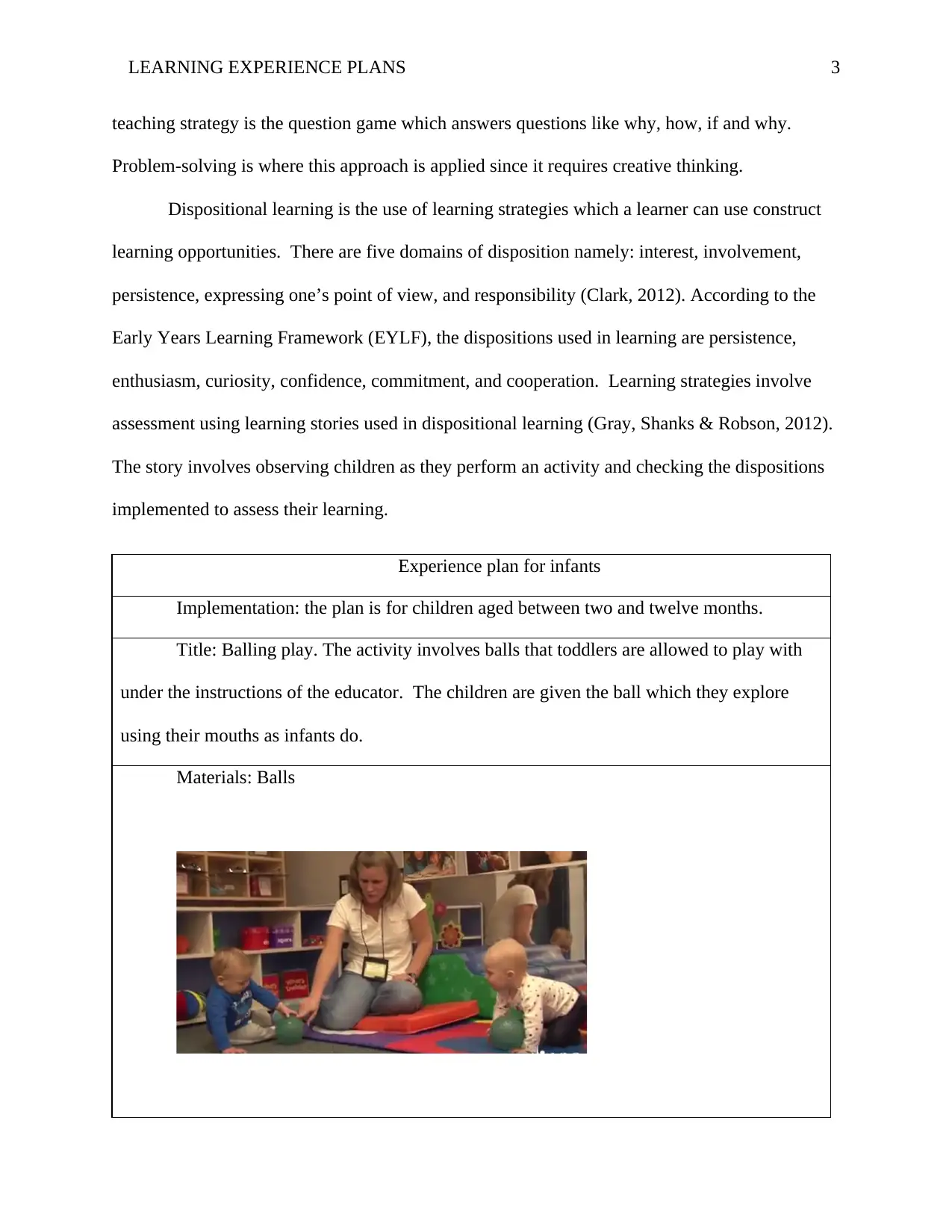
LEARNING EXPERIENCE PLANS 3
teaching strategy is the question game which answers questions like why, how, if and why.
Problem-solving is where this approach is applied since it requires creative thinking.
Dispositional learning is the use of learning strategies which a learner can use construct
learning opportunities. There are five domains of disposition namely: interest, involvement,
persistence, expressing one’s point of view, and responsibility (Clark, 2012). According to the
Early Years Learning Framework (EYLF), the dispositions used in learning are persistence,
enthusiasm, curiosity, confidence, commitment, and cooperation. Learning strategies involve
assessment using learning stories used in dispositional learning (Gray, Shanks & Robson, 2012).
The story involves observing children as they perform an activity and checking the dispositions
implemented to assess their learning.
Experience plan for infants
Implementation: the plan is for children aged between two and twelve months.
Title: Balling play. The activity involves balls that toddlers are allowed to play with
under the instructions of the educator. The children are given the ball which they explore
using their mouths as infants do.
Materials: Balls
teaching strategy is the question game which answers questions like why, how, if and why.
Problem-solving is where this approach is applied since it requires creative thinking.
Dispositional learning is the use of learning strategies which a learner can use construct
learning opportunities. There are five domains of disposition namely: interest, involvement,
persistence, expressing one’s point of view, and responsibility (Clark, 2012). According to the
Early Years Learning Framework (EYLF), the dispositions used in learning are persistence,
enthusiasm, curiosity, confidence, commitment, and cooperation. Learning strategies involve
assessment using learning stories used in dispositional learning (Gray, Shanks & Robson, 2012).
The story involves observing children as they perform an activity and checking the dispositions
implemented to assess their learning.
Experience plan for infants
Implementation: the plan is for children aged between two and twelve months.
Title: Balling play. The activity involves balls that toddlers are allowed to play with
under the instructions of the educator. The children are given the ball which they explore
using their mouths as infants do.
Materials: Balls
⊘ This is a preview!⊘
Do you want full access?
Subscribe today to unlock all pages.

Trusted by 1+ million students worldwide
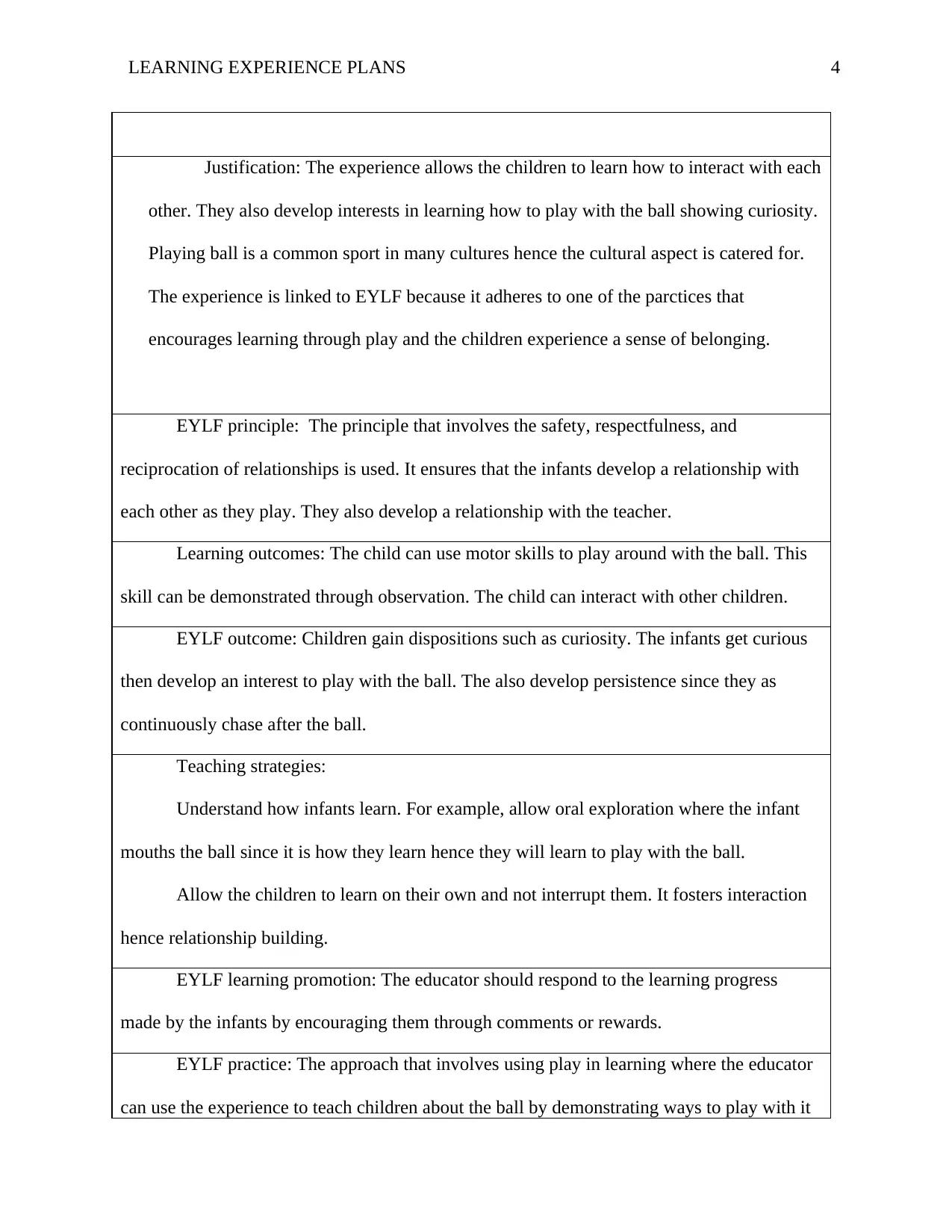
LEARNING EXPERIENCE PLANS 4
Justification: The experience allows the children to learn how to interact with each
other. They also develop interests in learning how to play with the ball showing curiosity.
Playing ball is a common sport in many cultures hence the cultural aspect is catered for.
The experience is linked to EYLF because it adheres to one of the parctices that
encourages learning through play and the children experience a sense of belonging.
EYLF principle: The principle that involves the safety, respectfulness, and
reciprocation of relationships is used. It ensures that the infants develop a relationship with
each other as they play. They also develop a relationship with the teacher.
Learning outcomes: The child can use motor skills to play around with the ball. This
skill can be demonstrated through observation. The child can interact with other children.
EYLF outcome: Children gain dispositions such as curiosity. The infants get curious
then develop an interest to play with the ball. The also develop persistence since they as
continuously chase after the ball.
Teaching strategies:
Understand how infants learn. For example, allow oral exploration where the infant
mouths the ball since it is how they learn hence they will learn to play with the ball.
Allow the children to learn on their own and not interrupt them. It fosters interaction
hence relationship building.
EYLF learning promotion: The educator should respond to the learning progress
made by the infants by encouraging them through comments or rewards.
EYLF practice: The approach that involves using play in learning where the educator
can use the experience to teach children about the ball by demonstrating ways to play with it
Justification: The experience allows the children to learn how to interact with each
other. They also develop interests in learning how to play with the ball showing curiosity.
Playing ball is a common sport in many cultures hence the cultural aspect is catered for.
The experience is linked to EYLF because it adheres to one of the parctices that
encourages learning through play and the children experience a sense of belonging.
EYLF principle: The principle that involves the safety, respectfulness, and
reciprocation of relationships is used. It ensures that the infants develop a relationship with
each other as they play. They also develop a relationship with the teacher.
Learning outcomes: The child can use motor skills to play around with the ball. This
skill can be demonstrated through observation. The child can interact with other children.
EYLF outcome: Children gain dispositions such as curiosity. The infants get curious
then develop an interest to play with the ball. The also develop persistence since they as
continuously chase after the ball.
Teaching strategies:
Understand how infants learn. For example, allow oral exploration where the infant
mouths the ball since it is how they learn hence they will learn to play with the ball.
Allow the children to learn on their own and not interrupt them. It fosters interaction
hence relationship building.
EYLF learning promotion: The educator should respond to the learning progress
made by the infants by encouraging them through comments or rewards.
EYLF practice: The approach that involves using play in learning where the educator
can use the experience to teach children about the ball by demonstrating ways to play with it
Paraphrase This Document
Need a fresh take? Get an instant paraphrase of this document with our AI Paraphraser
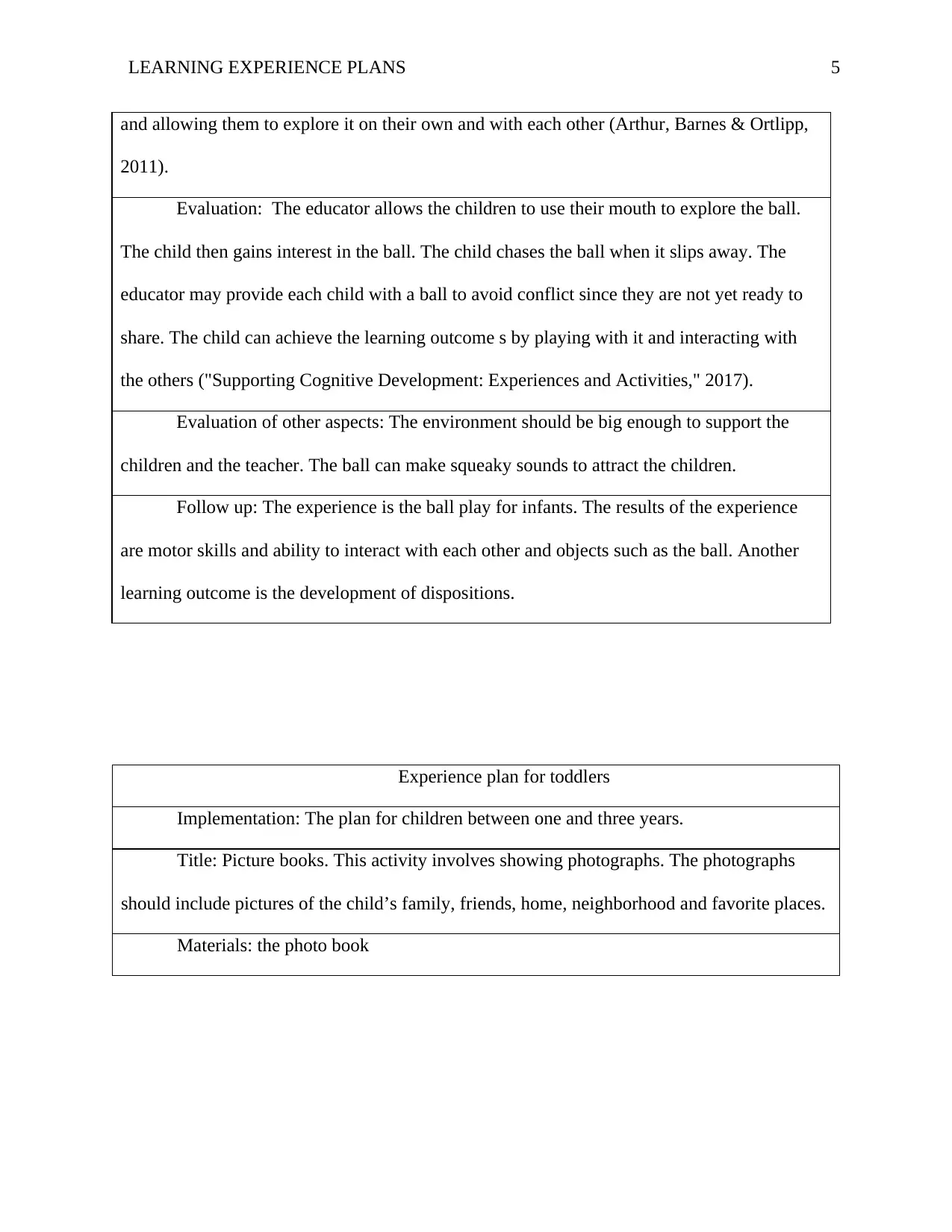
LEARNING EXPERIENCE PLANS 5
and allowing them to explore it on their own and with each other (Arthur, Barnes & Ortlipp,
2011).
Evaluation: The educator allows the children to use their mouth to explore the ball.
The child then gains interest in the ball. The child chases the ball when it slips away. The
educator may provide each child with a ball to avoid conflict since they are not yet ready to
share. The child can achieve the learning outcome s by playing with it and interacting with
the others ("Supporting Cognitive Development: Experiences and Activities," 2017).
Evaluation of other aspects: The environment should be big enough to support the
children and the teacher. The ball can make squeaky sounds to attract the children.
Follow up: The experience is the ball play for infants. The results of the experience
are motor skills and ability to interact with each other and objects such as the ball. Another
learning outcome is the development of dispositions.
Experience plan for toddlers
Implementation: The plan for children between one and three years.
Title: Picture books. This activity involves showing photographs. The photographs
should include pictures of the child’s family, friends, home, neighborhood and favorite places.
Materials: the photo book
and allowing them to explore it on their own and with each other (Arthur, Barnes & Ortlipp,
2011).
Evaluation: The educator allows the children to use their mouth to explore the ball.
The child then gains interest in the ball. The child chases the ball when it slips away. The
educator may provide each child with a ball to avoid conflict since they are not yet ready to
share. The child can achieve the learning outcome s by playing with it and interacting with
the others ("Supporting Cognitive Development: Experiences and Activities," 2017).
Evaluation of other aspects: The environment should be big enough to support the
children and the teacher. The ball can make squeaky sounds to attract the children.
Follow up: The experience is the ball play for infants. The results of the experience
are motor skills and ability to interact with each other and objects such as the ball. Another
learning outcome is the development of dispositions.
Experience plan for toddlers
Implementation: The plan for children between one and three years.
Title: Picture books. This activity involves showing photographs. The photographs
should include pictures of the child’s family, friends, home, neighborhood and favorite places.
Materials: the photo book
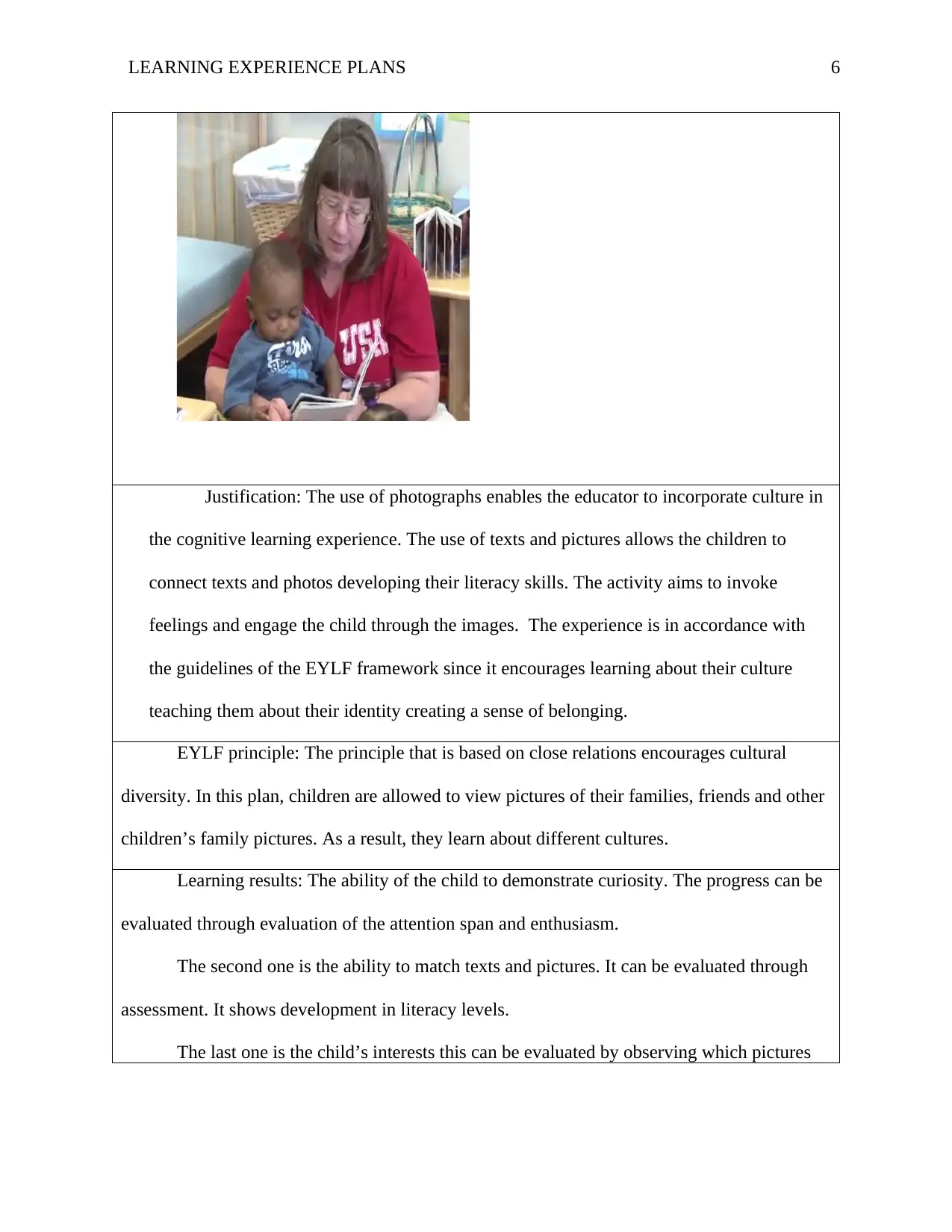
LEARNING EXPERIENCE PLANS 6
Justification: The use of photographs enables the educator to incorporate culture in
the cognitive learning experience. The use of texts and pictures allows the children to
connect texts and photos developing their literacy skills. The activity aims to invoke
feelings and engage the child through the images. The experience is in accordance with
the guidelines of the EYLF framework since it encourages learning about their culture
teaching them about their identity creating a sense of belonging.
EYLF principle: The principle that is based on close relations encourages cultural
diversity. In this plan, children are allowed to view pictures of their families, friends and other
children’s family pictures. As a result, they learn about different cultures.
Learning results: The ability of the child to demonstrate curiosity. The progress can be
evaluated through evaluation of the attention span and enthusiasm.
The second one is the ability to match texts and pictures. It can be evaluated through
assessment. It shows development in literacy levels.
The last one is the child’s interests this can be evaluated by observing which pictures
Justification: The use of photographs enables the educator to incorporate culture in
the cognitive learning experience. The use of texts and pictures allows the children to
connect texts and photos developing their literacy skills. The activity aims to invoke
feelings and engage the child through the images. The experience is in accordance with
the guidelines of the EYLF framework since it encourages learning about their culture
teaching them about their identity creating a sense of belonging.
EYLF principle: The principle that is based on close relations encourages cultural
diversity. In this plan, children are allowed to view pictures of their families, friends and other
children’s family pictures. As a result, they learn about different cultures.
Learning results: The ability of the child to demonstrate curiosity. The progress can be
evaluated through evaluation of the attention span and enthusiasm.
The second one is the ability to match texts and pictures. It can be evaluated through
assessment. It shows development in literacy levels.
The last one is the child’s interests this can be evaluated by observing which pictures
⊘ This is a preview!⊘
Do you want full access?
Subscribe today to unlock all pages.

Trusted by 1+ million students worldwide
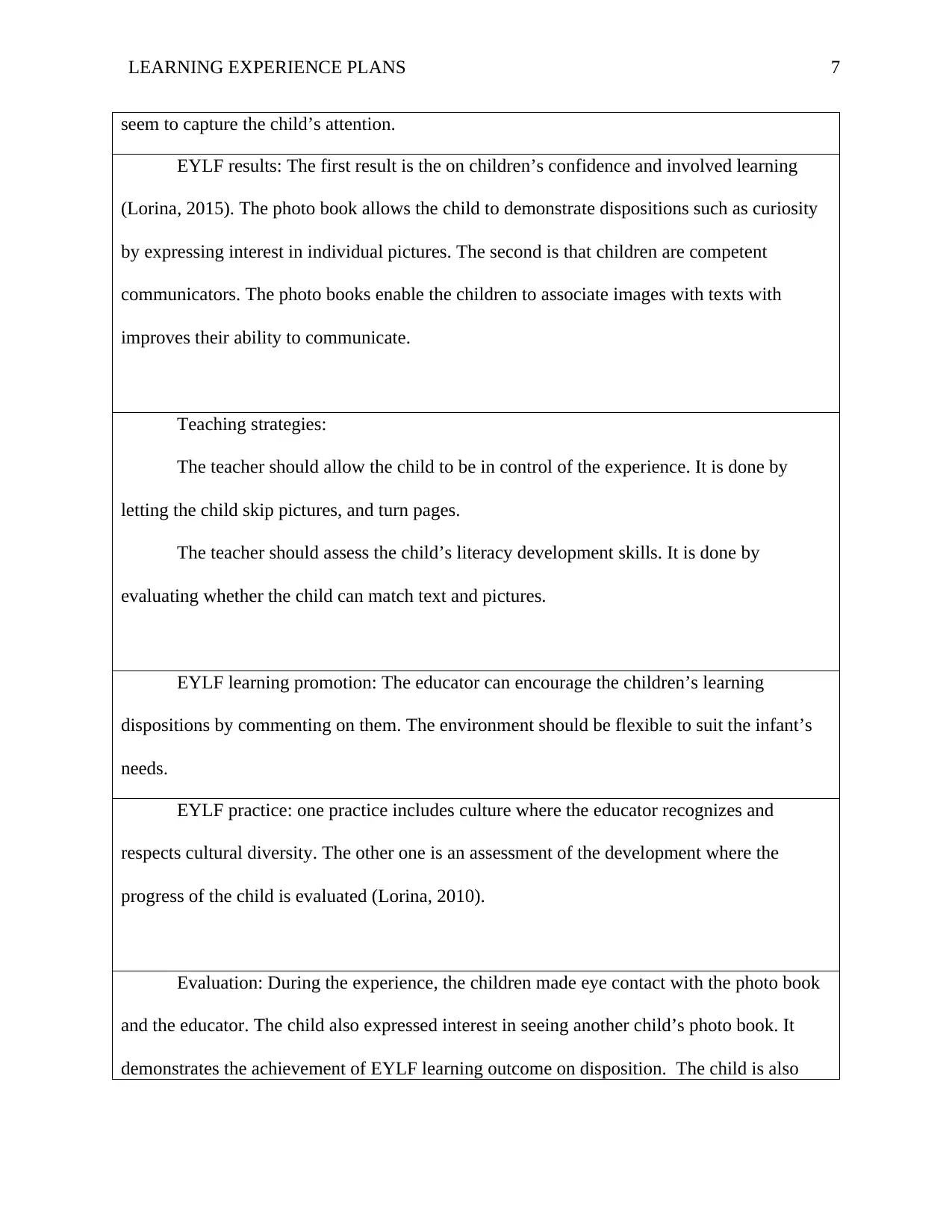
LEARNING EXPERIENCE PLANS 7
seem to capture the child’s attention.
EYLF results: The first result is the on children’s confidence and involved learning
(Lorina, 2015). The photo book allows the child to demonstrate dispositions such as curiosity
by expressing interest in individual pictures. The second is that children are competent
communicators. The photo books enable the children to associate images with texts with
improves their ability to communicate.
Teaching strategies:
The teacher should allow the child to be in control of the experience. It is done by
letting the child skip pictures, and turn pages.
The teacher should assess the child’s literacy development skills. It is done by
evaluating whether the child can match text and pictures.
EYLF learning promotion: The educator can encourage the children’s learning
dispositions by commenting on them. The environment should be flexible to suit the infant’s
needs.
EYLF practice: one practice includes culture where the educator recognizes and
respects cultural diversity. The other one is an assessment of the development where the
progress of the child is evaluated (Lorina, 2010).
Evaluation: During the experience, the children made eye contact with the photo book
and the educator. The child also expressed interest in seeing another child’s photo book. It
demonstrates the achievement of EYLF learning outcome on disposition. The child is also
seem to capture the child’s attention.
EYLF results: The first result is the on children’s confidence and involved learning
(Lorina, 2015). The photo book allows the child to demonstrate dispositions such as curiosity
by expressing interest in individual pictures. The second is that children are competent
communicators. The photo books enable the children to associate images with texts with
improves their ability to communicate.
Teaching strategies:
The teacher should allow the child to be in control of the experience. It is done by
letting the child skip pictures, and turn pages.
The teacher should assess the child’s literacy development skills. It is done by
evaluating whether the child can match text and pictures.
EYLF learning promotion: The educator can encourage the children’s learning
dispositions by commenting on them. The environment should be flexible to suit the infant’s
needs.
EYLF practice: one practice includes culture where the educator recognizes and
respects cultural diversity. The other one is an assessment of the development where the
progress of the child is evaluated (Lorina, 2010).
Evaluation: During the experience, the children made eye contact with the photo book
and the educator. The child also expressed interest in seeing another child’s photo book. It
demonstrates the achievement of EYLF learning outcome on disposition. The child is also
Paraphrase This Document
Need a fresh take? Get an instant paraphrase of this document with our AI Paraphraser
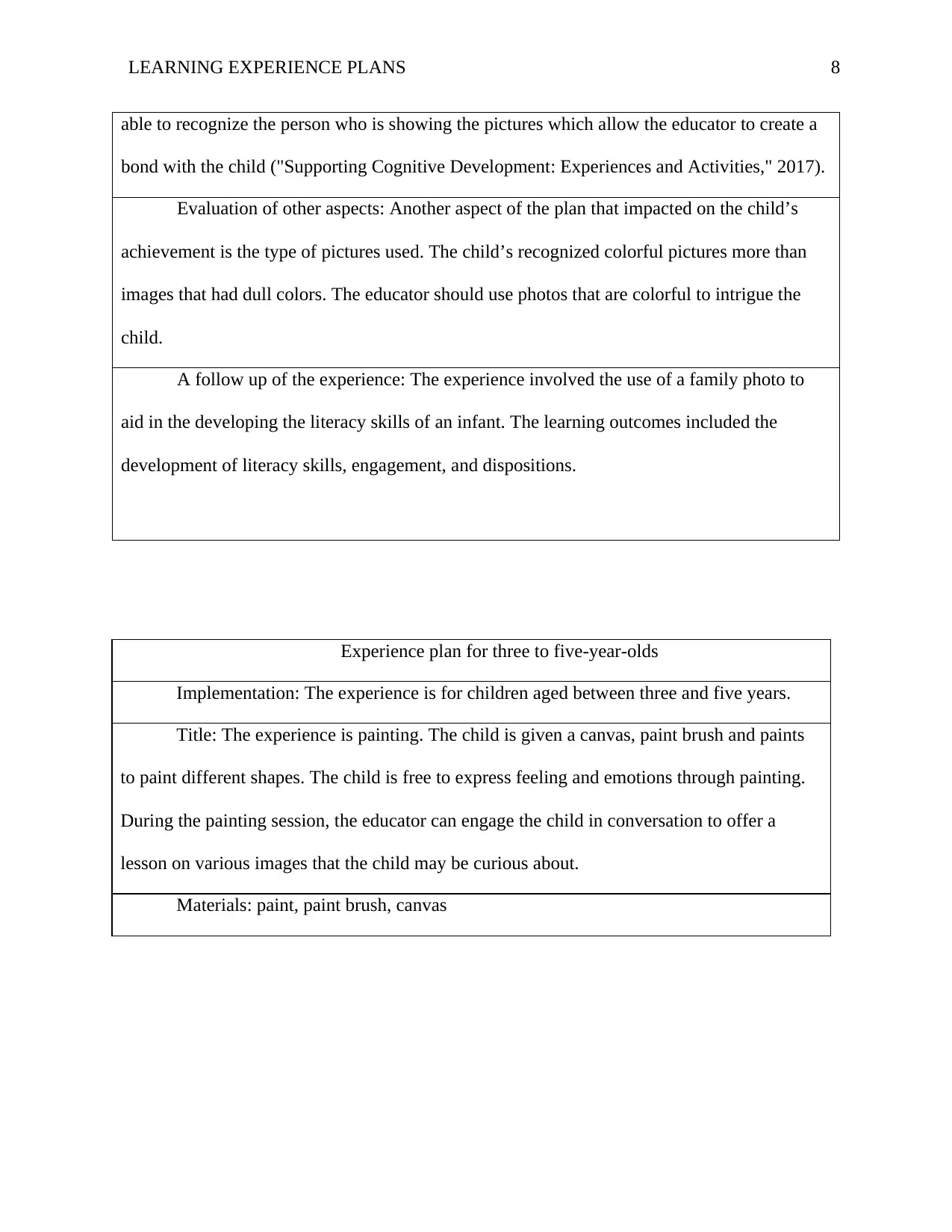
LEARNING EXPERIENCE PLANS 8
able to recognize the person who is showing the pictures which allow the educator to create a
bond with the child ("Supporting Cognitive Development: Experiences and Activities," 2017).
Evaluation of other aspects: Another aspect of the plan that impacted on the child’s
achievement is the type of pictures used. The child’s recognized colorful pictures more than
images that had dull colors. The educator should use photos that are colorful to intrigue the
child.
A follow up of the experience: The experience involved the use of a family photo to
aid in the developing the literacy skills of an infant. The learning outcomes included the
development of literacy skills, engagement, and dispositions.
Experience plan for three to five-year-olds
Implementation: The experience is for children aged between three and five years.
Title: The experience is painting. The child is given a canvas, paint brush and paints
to paint different shapes. The child is free to express feeling and emotions through painting.
During the painting session, the educator can engage the child in conversation to offer a
lesson on various images that the child may be curious about.
Materials: paint, paint brush, canvas
able to recognize the person who is showing the pictures which allow the educator to create a
bond with the child ("Supporting Cognitive Development: Experiences and Activities," 2017).
Evaluation of other aspects: Another aspect of the plan that impacted on the child’s
achievement is the type of pictures used. The child’s recognized colorful pictures more than
images that had dull colors. The educator should use photos that are colorful to intrigue the
child.
A follow up of the experience: The experience involved the use of a family photo to
aid in the developing the literacy skills of an infant. The learning outcomes included the
development of literacy skills, engagement, and dispositions.
Experience plan for three to five-year-olds
Implementation: The experience is for children aged between three and five years.
Title: The experience is painting. The child is given a canvas, paint brush and paints
to paint different shapes. The child is free to express feeling and emotions through painting.
During the painting session, the educator can engage the child in conversation to offer a
lesson on various images that the child may be curious about.
Materials: paint, paint brush, canvas
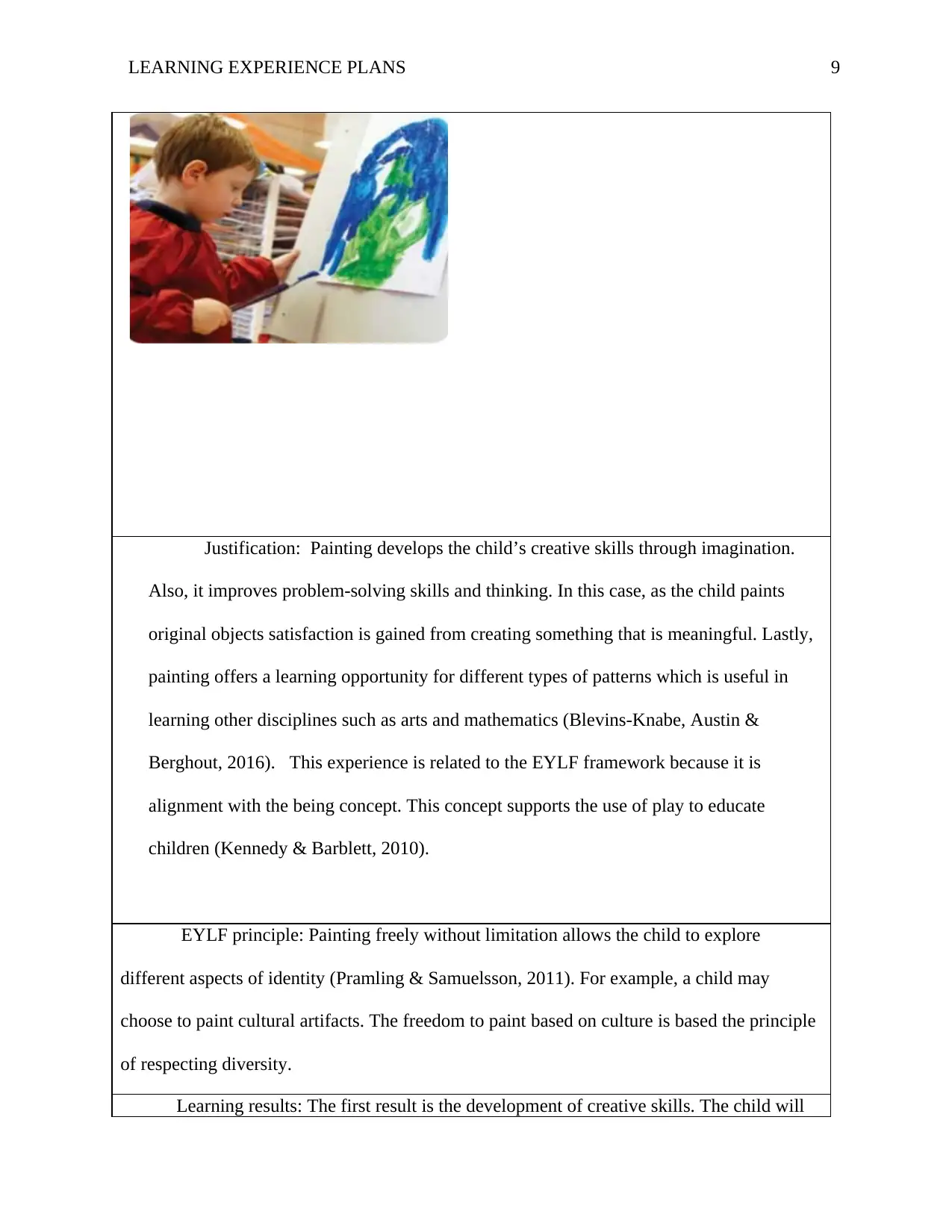
LEARNING EXPERIENCE PLANS 9
Justification: Painting develops the child’s creative skills through imagination.
Also, it improves problem-solving skills and thinking. In this case, as the child paints
original objects satisfaction is gained from creating something that is meaningful. Lastly,
painting offers a learning opportunity for different types of patterns which is useful in
learning other disciplines such as arts and mathematics (Blevins-Knabe, Austin &
Berghout, 2016). This experience is related to the EYLF framework because it is
alignment with the being concept. This concept supports the use of play to educate
children (Kennedy & Barblett, 2010).
EYLF principle: Painting freely without limitation allows the child to explore
different aspects of identity (Pramling & Samuelsson, 2011). For example, a child may
choose to paint cultural artifacts. The freedom to paint based on culture is based the principle
of respecting diversity.
Learning results: The first result is the development of creative skills. The child will
Justification: Painting develops the child’s creative skills through imagination.
Also, it improves problem-solving skills and thinking. In this case, as the child paints
original objects satisfaction is gained from creating something that is meaningful. Lastly,
painting offers a learning opportunity for different types of patterns which is useful in
learning other disciplines such as arts and mathematics (Blevins-Knabe, Austin &
Berghout, 2016). This experience is related to the EYLF framework because it is
alignment with the being concept. This concept supports the use of play to educate
children (Kennedy & Barblett, 2010).
EYLF principle: Painting freely without limitation allows the child to explore
different aspects of identity (Pramling & Samuelsson, 2011). For example, a child may
choose to paint cultural artifacts. The freedom to paint based on culture is based the principle
of respecting diversity.
Learning results: The first result is the development of creative skills. The child will
⊘ This is a preview!⊘
Do you want full access?
Subscribe today to unlock all pages.

Trusted by 1+ million students worldwide
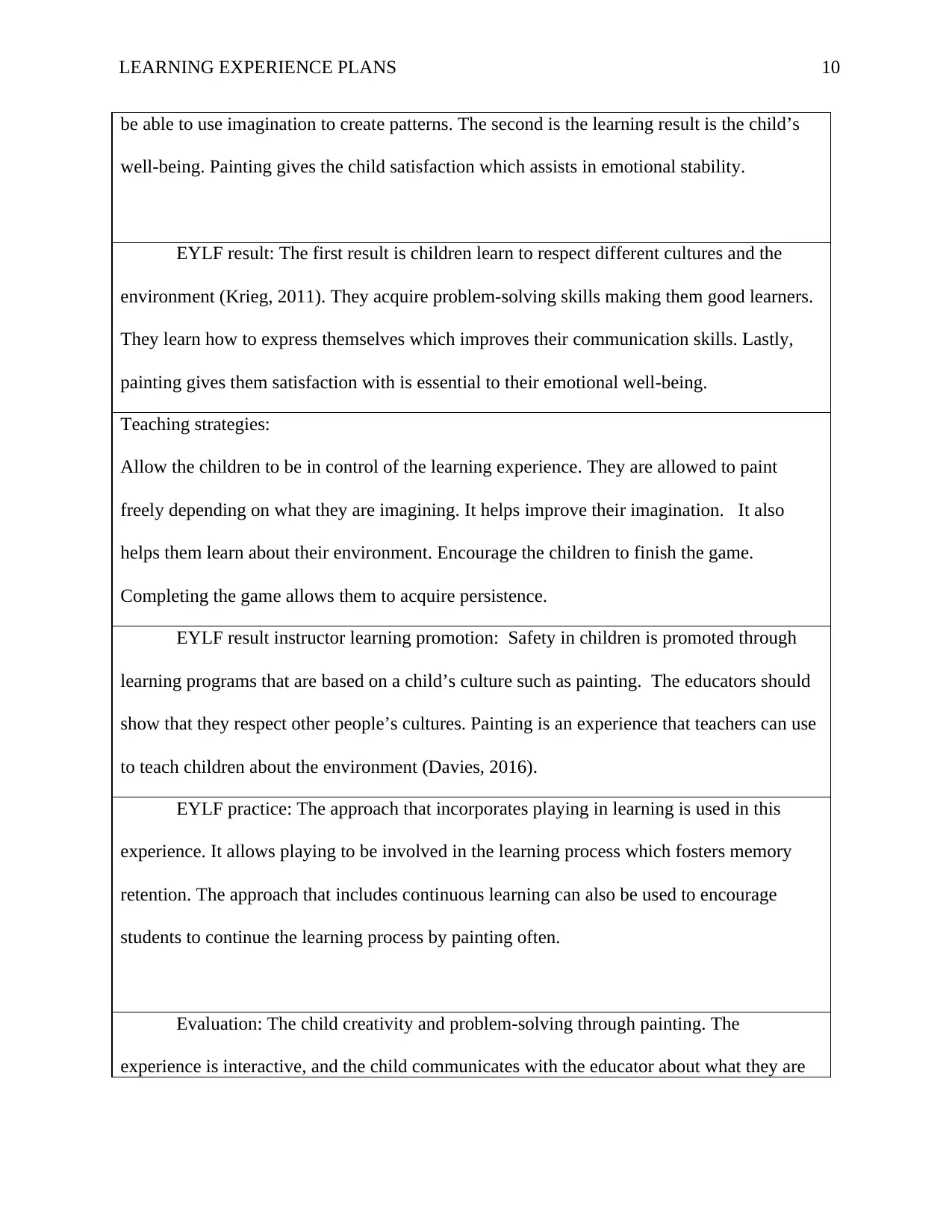
LEARNING EXPERIENCE PLANS 10
be able to use imagination to create patterns. The second is the learning result is the child’s
well-being. Painting gives the child satisfaction which assists in emotional stability.
EYLF result: The first result is children learn to respect different cultures and the
environment (Krieg, 2011). They acquire problem-solving skills making them good learners.
They learn how to express themselves which improves their communication skills. Lastly,
painting gives them satisfaction with is essential to their emotional well-being.
Teaching strategies:
Allow the children to be in control of the learning experience. They are allowed to paint
freely depending on what they are imagining. It helps improve their imagination. It also
helps them learn about their environment. Encourage the children to finish the game.
Completing the game allows them to acquire persistence.
EYLF result instructor learning promotion: Safety in children is promoted through
learning programs that are based on a child’s culture such as painting. The educators should
show that they respect other people’s cultures. Painting is an experience that teachers can use
to teach children about the environment (Davies, 2016).
EYLF practice: The approach that incorporates playing in learning is used in this
experience. It allows playing to be involved in the learning process which fosters memory
retention. The approach that includes continuous learning can also be used to encourage
students to continue the learning process by painting often.
Evaluation: The child creativity and problem-solving through painting. The
experience is interactive, and the child communicates with the educator about what they are
be able to use imagination to create patterns. The second is the learning result is the child’s
well-being. Painting gives the child satisfaction which assists in emotional stability.
EYLF result: The first result is children learn to respect different cultures and the
environment (Krieg, 2011). They acquire problem-solving skills making them good learners.
They learn how to express themselves which improves their communication skills. Lastly,
painting gives them satisfaction with is essential to their emotional well-being.
Teaching strategies:
Allow the children to be in control of the learning experience. They are allowed to paint
freely depending on what they are imagining. It helps improve their imagination. It also
helps them learn about their environment. Encourage the children to finish the game.
Completing the game allows them to acquire persistence.
EYLF result instructor learning promotion: Safety in children is promoted through
learning programs that are based on a child’s culture such as painting. The educators should
show that they respect other people’s cultures. Painting is an experience that teachers can use
to teach children about the environment (Davies, 2016).
EYLF practice: The approach that incorporates playing in learning is used in this
experience. It allows playing to be involved in the learning process which fosters memory
retention. The approach that includes continuous learning can also be used to encourage
students to continue the learning process by painting often.
Evaluation: The child creativity and problem-solving through painting. The
experience is interactive, and the child communicates with the educator about what they are
Paraphrase This Document
Need a fresh take? Get an instant paraphrase of this document with our AI Paraphraser
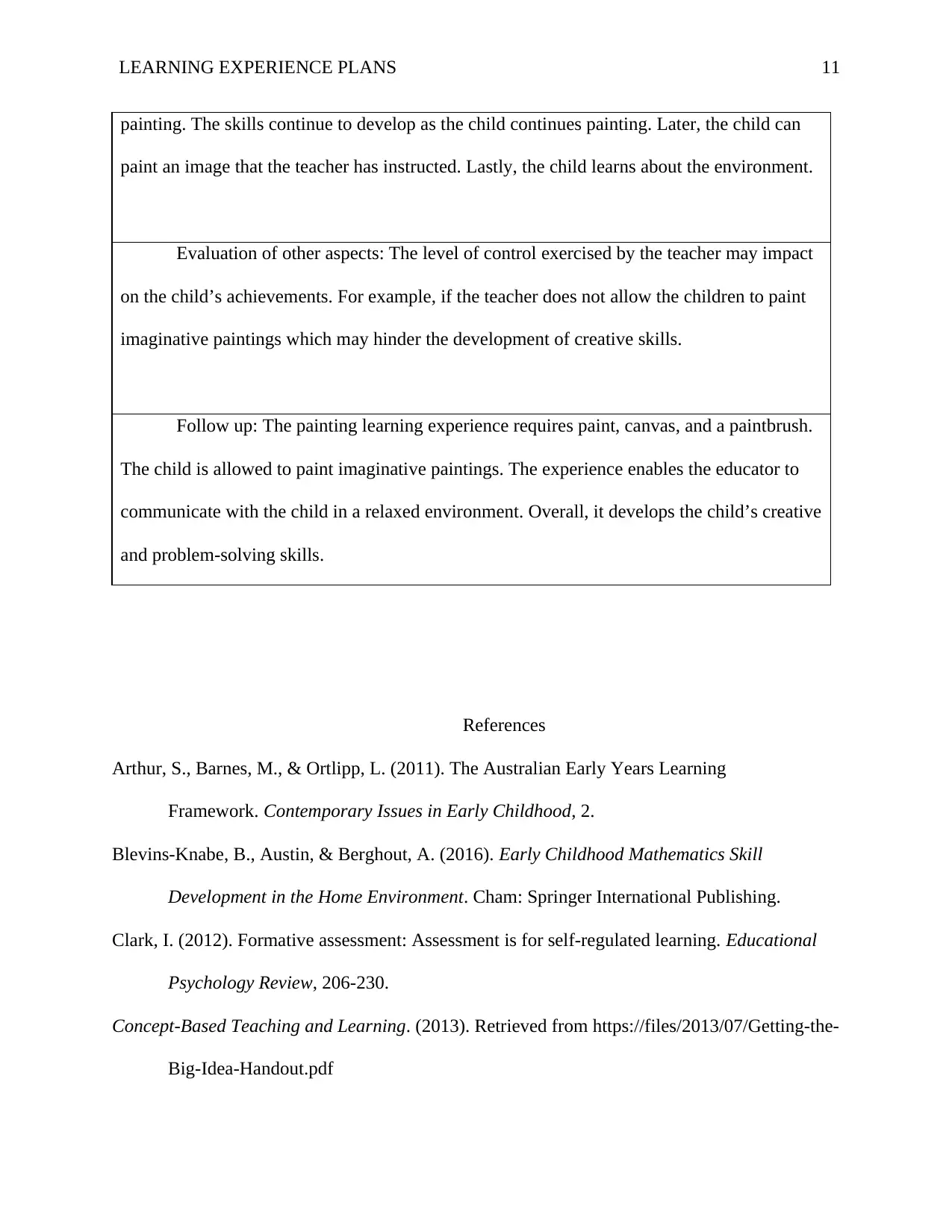
LEARNING EXPERIENCE PLANS 11
painting. The skills continue to develop as the child continues painting. Later, the child can
paint an image that the teacher has instructed. Lastly, the child learns about the environment.
Evaluation of other aspects: The level of control exercised by the teacher may impact
on the child’s achievements. For example, if the teacher does not allow the children to paint
imaginative paintings which may hinder the development of creative skills.
Follow up: The painting learning experience requires paint, canvas, and a paintbrush.
The child is allowed to paint imaginative paintings. The experience enables the educator to
communicate with the child in a relaxed environment. Overall, it develops the child’s creative
and problem-solving skills.
References
Arthur, S., Barnes, M., & Ortlipp, L. (2011). The Australian Early Years Learning
Framework. Contemporary Issues in Early Childhood, 2.
Blevins-Knabe, B., Austin, & Berghout, A. (2016). Early Childhood Mathematics Skill
Development in the Home Environment. Cham: Springer International Publishing.
Clark, I. (2012). Formative assessment: Assessment is for self-regulated learning. Educational
Psychology Review, 206-230.
Concept-Based Teaching and Learning. (2013). Retrieved from https://files/2013/07/Getting-the-
Big-Idea-Handout.pdf
painting. The skills continue to develop as the child continues painting. Later, the child can
paint an image that the teacher has instructed. Lastly, the child learns about the environment.
Evaluation of other aspects: The level of control exercised by the teacher may impact
on the child’s achievements. For example, if the teacher does not allow the children to paint
imaginative paintings which may hinder the development of creative skills.
Follow up: The painting learning experience requires paint, canvas, and a paintbrush.
The child is allowed to paint imaginative paintings. The experience enables the educator to
communicate with the child in a relaxed environment. Overall, it develops the child’s creative
and problem-solving skills.
References
Arthur, S., Barnes, M., & Ortlipp, L. (2011). The Australian Early Years Learning
Framework. Contemporary Issues in Early Childhood, 2.
Blevins-Knabe, B., Austin, & Berghout, A. (2016). Early Childhood Mathematics Skill
Development in the Home Environment. Cham: Springer International Publishing.
Clark, I. (2012). Formative assessment: Assessment is for self-regulated learning. Educational
Psychology Review, 206-230.
Concept-Based Teaching and Learning. (2013). Retrieved from https://files/2013/07/Getting-the-
Big-Idea-Handout.pdf
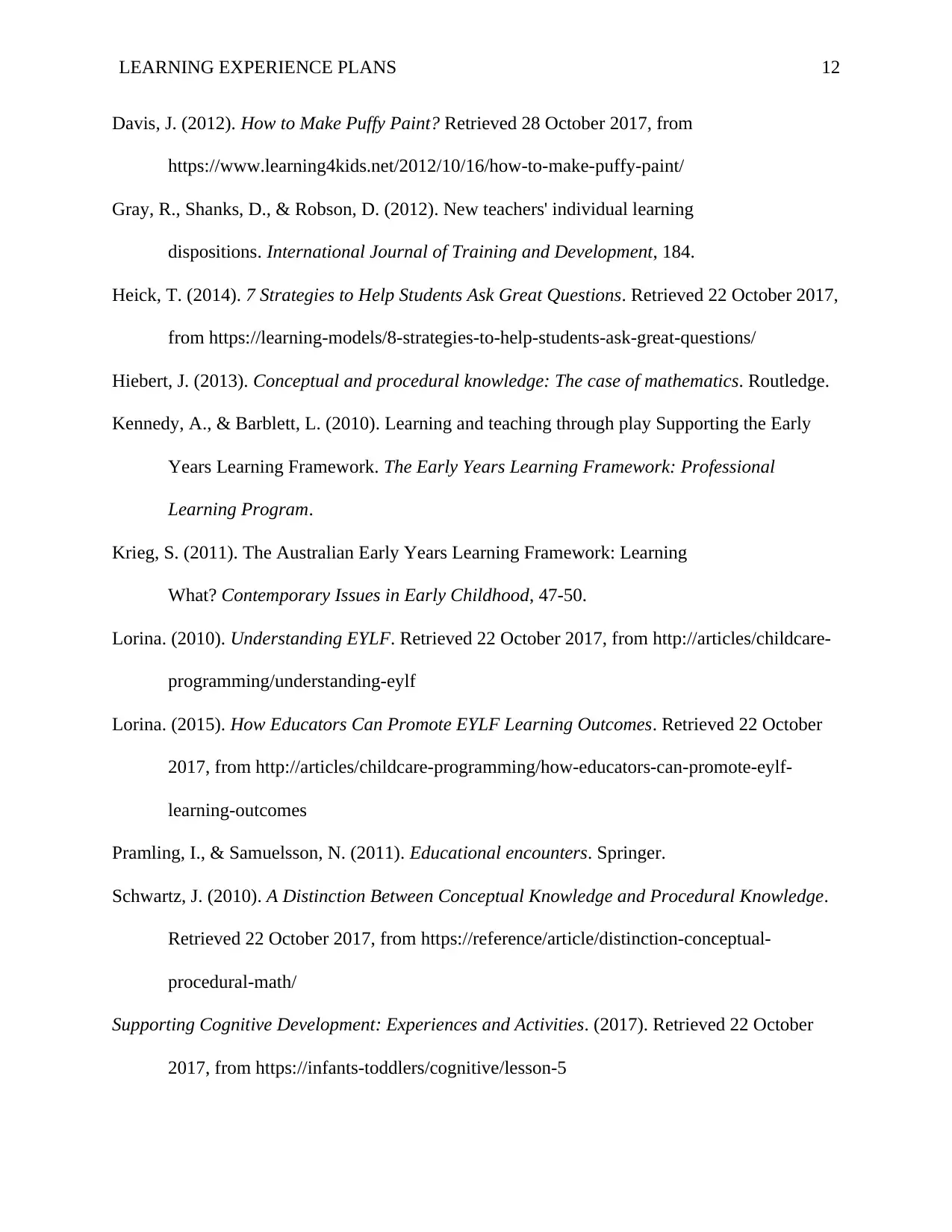
LEARNING EXPERIENCE PLANS 12
Davis, J. (2012). How to Make Puffy Paint? Retrieved 28 October 2017, from
https://www.learning4kids.net/2012/10/16/how-to-make-puffy-paint/
Gray, R., Shanks, D., & Robson, D. (2012). New teachers' individual learning
dispositions. International Journal of Training and Development, 184.
Heick, T. (2014). 7 Strategies to Help Students Ask Great Questions. Retrieved 22 October 2017,
from https://learning-models/8-strategies-to-help-students-ask-great-questions/
Hiebert, J. (2013). Conceptual and procedural knowledge: The case of mathematics. Routledge.
Kennedy, A., & Barblett, L. (2010). Learning and teaching through play Supporting the Early
Years Learning Framework. The Early Years Learning Framework: Professional
Learning Program.
Krieg, S. (2011). The Australian Early Years Learning Framework: Learning
What? Contemporary Issues in Early Childhood, 47-50.
Lorina. (2010). Understanding EYLF. Retrieved 22 October 2017, from http://articles/childcare-
programming/understanding-eylf
Lorina. (2015). How Educators Can Promote EYLF Learning Outcomes. Retrieved 22 October
2017, from http://articles/childcare-programming/how-educators-can-promote-eylf-
learning-outcomes
Pramling, I., & Samuelsson, N. (2011). Educational encounters. Springer.
Schwartz, J. (2010). A Distinction Between Conceptual Knowledge and Procedural Knowledge.
Retrieved 22 October 2017, from https://reference/article/distinction-conceptual-
procedural-math/
Supporting Cognitive Development: Experiences and Activities. (2017). Retrieved 22 October
2017, from https://infants-toddlers/cognitive/lesson-5
Davis, J. (2012). How to Make Puffy Paint? Retrieved 28 October 2017, from
https://www.learning4kids.net/2012/10/16/how-to-make-puffy-paint/
Gray, R., Shanks, D., & Robson, D. (2012). New teachers' individual learning
dispositions. International Journal of Training and Development, 184.
Heick, T. (2014). 7 Strategies to Help Students Ask Great Questions. Retrieved 22 October 2017,
from https://learning-models/8-strategies-to-help-students-ask-great-questions/
Hiebert, J. (2013). Conceptual and procedural knowledge: The case of mathematics. Routledge.
Kennedy, A., & Barblett, L. (2010). Learning and teaching through play Supporting the Early
Years Learning Framework. The Early Years Learning Framework: Professional
Learning Program.
Krieg, S. (2011). The Australian Early Years Learning Framework: Learning
What? Contemporary Issues in Early Childhood, 47-50.
Lorina. (2010). Understanding EYLF. Retrieved 22 October 2017, from http://articles/childcare-
programming/understanding-eylf
Lorina. (2015). How Educators Can Promote EYLF Learning Outcomes. Retrieved 22 October
2017, from http://articles/childcare-programming/how-educators-can-promote-eylf-
learning-outcomes
Pramling, I., & Samuelsson, N. (2011). Educational encounters. Springer.
Schwartz, J. (2010). A Distinction Between Conceptual Knowledge and Procedural Knowledge.
Retrieved 22 October 2017, from https://reference/article/distinction-conceptual-
procedural-math/
Supporting Cognitive Development: Experiences and Activities. (2017). Retrieved 22 October
2017, from https://infants-toddlers/cognitive/lesson-5
⊘ This is a preview!⊘
Do you want full access?
Subscribe today to unlock all pages.

Trusted by 1+ million students worldwide
1 out of 12
Related Documents
Your All-in-One AI-Powered Toolkit for Academic Success.
+13062052269
info@desklib.com
Available 24*7 on WhatsApp / Email
![[object Object]](/_next/static/media/star-bottom.7253800d.svg)
Unlock your academic potential
Copyright © 2020–2026 A2Z Services. All Rights Reserved. Developed and managed by ZUCOL.




